WMG News
WMG Professor joins Clean Growth Leadership Network
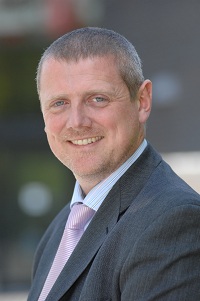 Head of WMG’s Sustainable Materials and Manufacturing Research Group, Professor Kerry Kirwan, has been appointed as a Fellow to the Clean Growth Leadership Network (CGLN).
Head of WMG’s Sustainable Materials and Manufacturing Research Group, Professor Kerry Kirwan, has been appointed as a Fellow to the Clean Growth Leadership Network (CGLN).
The CGLN is committed to economic growth for all whilst substantially reducing carbon emissions. The world-class network is made up of Founders, Fellows, Partners and Members united in their commitment to transform to a global clean economy.
Professor Kirwan explains: “I am delighted to have been appointed as a Fellow of the Clean Growth Leadership Network – the opportunity to work with some of the UK’s leading thinkers and practitioners tackling critical issues on the climate change agenda is hugely exciting. I’m really looking forward to introducing them to our research here at WMG and the wider University.”
Professor Kirwan is a specialist in circular economy, sustainable materials, polymer processing and industrial applications. He has extensive experience of developing environmentally friendly materials for application within numerous industries.
Read more about WMG’s Sustainable Materials and Manufacturing research here: Sustainable materials and manufacturing (warwick.ac.uk)
Five WMG researchers to become Turing Fellows this academic year
Five members of staff from WMG have been named as Fellows of the Alan Turing Institute this year.
Turing Fellows are scholars with proven research excellence in data science, artificial intelligence (AI) or a related field, whose research will be significantly enhanced through active involvement with the Turing network of universities and partners.
The Alan Turing Institute is the UK’s national institute for data science and AI, aims to attract and retain exceptional researchers in artificial intelligence and the University of Warwick is a founding partner.
Covering a broad view of AI, including applications of foundational disciplines across mathematical sciences, statistical sciences, computational sciences and engineering, Fellows work together across disciplines and have the opportunity to collaborate with academia, industry, government and the third sector.
In total 37 researchers from the University of Warwick, from across the fields of mathematics, life sciences, statistics, computer science, business, medicine and engineering, have been named as Fellows of the Alan Turing Institute this year.
Pro Vice Chancellor for Research at the University of Warwick, Professor Caroline Meyer, said: “I am delighted that so many Warwick researchers have been named as Fellows of the Alan Turing Institute this year. It shows Warwick’s strength and breadth when it comes to working at the forefront of data science and AI.
“There is a diverse range of expertise in this cohort ranging from epidemiology and disease to the disciplines of pure mathematics and computational sciences. Data Science is one of the key research priorities for the University of Warwick and our people continue to drive research through collaborative work with institutions like Turing.”
The five WMG fellows of the Alan Turing Institute are:
Associate Professor Michael Auinger
Professor Mehrdad Dianati
Assistant Professor Truong Quang Dinh
Professor Carsten Maple
The Alan Turing Institute Director and Chief Executive, Adrian Smith, said: “It gives me great pleasure to welcome this new group of Fellows. This cohort is incredibly multidisciplinary and diverse. They will bring a rich range of expertise and ensure we continue to do world-leading, impactful research.”
The full list of Warwick’s Turing fellows and details of their research can be found here: https://warwick.ac.uk/research/turing/fellows
-ends-
Notes for editors:
The Alan Turing Institute is the UK’s national institute for data science and artificial intelligence.
The Institute is named in honour of Alan Turing, whose pioneering work in theoretical and applied mathematics, engineering and computing is considered to have laid the foundations for modern-day data science and artificial intelligence. The Institute’s goals are to undertake world-class research in data science and artificial intelligence, apply its research to real-world problems, drive economic impact and societal good, lead the training of a new generation of scientists, and shape the public conversation around data.
Warwick’s Turing Fellows:
The full list of Warwick’s Turing fellows and details of their research can be found here:
https://warwick.ac.uk/research/turing/fellows
For further information please contact:
Alice Scott
Media Relations Manager – Science
University of Warwick
Tel: +44 (0) 2476 574 255 or +44 (0) 7920 531 221
E-mail: alice.j.scott@warwick.ac.uk
WMG Professors help tackle Net Zero solutions ahead of COP26
Ahead of COP26, voices across the political spectrum and from a range of leading UK universities have come together to produce a unique collection of essays focusing on Net Zero solutions.
Each is co-written by an academic and a Parliamentarian and sets out the areas where work is still needed on climate policy and demonstrates how readily to hand many policy and technical solutions are. It showcases the strength of UK science and research and the level of cross-party support for climate action.
Two WMG Professors have produced essays as part of the series. Professor David Greenwood together with Lilian Greenwood MP, has written ‘Driving the electric vehicle revolution’, and Professor Kerry Kirwan has, with Ben Lake MP, written ‘Overcoming barriers to the circular economy’.
Caroline Lucas MP, Chair of the APPG on Climate Change, explains: “The APPG on Climate Change was founded to coincide with the passing of the 2008 Climate Change Act – a vote that achieved almost unanimous support from across the political spectrum. As current Chair of the APPG on Climate Change, I see great value in striving to maintain and build upon this cross-party consensus where possible. We won’t all agree on the necessary course of action in each sector. And we may not even agree on the speed or scale with which it is necessary to reduce emissions. But we share a common conviction that the climate crisis is a challenge that can and must be surmounted. Deeper engagement between parliamentarians and the scientific community is a vital step in ensuring that we do. It is in that spirit that I fully endorse the work that has gone into producing this collection of essays.”
 In his essay, co-authored with Lilian Greenwood MP, Professor David Greenwood, CEO of WMG High Value Manufacturing Catapult at the University of Warwick explains: “Whilst the coronavirus pandemic has resulted in devastating personal and economic impacts, it has also caused us to challenge some of our preconceptions. The public has experienced clean air as a result of reduced transport and industrial emissions. People have taken to their bikes in record numbers and with the trials of rental e-scooters there’s a real opportunity for them to replace car and public transport usage for short journeys - at least in good weather.
In his essay, co-authored with Lilian Greenwood MP, Professor David Greenwood, CEO of WMG High Value Manufacturing Catapult at the University of Warwick explains: “Whilst the coronavirus pandemic has resulted in devastating personal and economic impacts, it has also caused us to challenge some of our preconceptions. The public has experienced clean air as a result of reduced transport and industrial emissions. People have taken to their bikes in record numbers and with the trials of rental e-scooters there’s a real opportunity for them to replace car and public transport usage for short journeys - at least in good weather.
“These behavioural shifts, along with the persistent drivers of air quality and climate change reinforce the shift to EVs.”
 Kerry Kirwan, WMG’s Professor of Sustainable Materials and Manufacturing explains: “Given the continued focus on how we use our limited planetary resources, the potential for green business models and practices to help our economic recovery post-pandemic and the imminence of COP26, it is great to see such a breadth of collected thinking coming together in this publication – it was a really valuable exercise that I am very pleased to have been part of”.
Kerry Kirwan, WMG’s Professor of Sustainable Materials and Manufacturing explains: “Given the continued focus on how we use our limited planetary resources, the potential for green business models and practices to help our economic recovery post-pandemic and the imminence of COP26, it is great to see such a breadth of collected thinking coming together in this publication – it was a really valuable exercise that I am very pleased to have been part of”.
Read the report and essays in full here: https://www.policyconnect.org.uk/research/net-zero-exchanges-connecting-policy-and-research-climate-action
About the APPCCG
The All-Party Parliamentary Climate Change Group runs events and activities in parliament with the purpose of advancing understanding of policy issues surrounding climate change and enabling cross-party discussion and action on climate policy.
This is not an official feed of the House of Commons or the House of Lords. It has not been approved by either House or its committees. All-Party Parliamentary Groups, forums and commissions are informal groups of Members of both Houses with a common interest in particular issues. The views expressed in the webpages are those of the groups.
About Policy Connect
Policy Connect is a membership-based, not-for-profit, cross-party think tank.
We bring together parliamentarians and government in collaboration with academia, business and civil society to inform, influence and improve UK public policy through debate, research and innovative thinking, so as to improve peoples’ lives.
We lead and manage an extensive network of parliamentary groups, research commissions, forums and campaigns. We are a London living wage and disability confident employer and a Member of Social Enterprise UK, and have been operating since 1995. Our work focuses on key policy areas including: health & accessibility; education & skills; industry, technology & innovation; and sustainability.
We shape policy in Westminster through meetings, events, research and impact work.
Prof. Lord Bhattacharyya building shortlisted for RIBA Client of the Year 2021
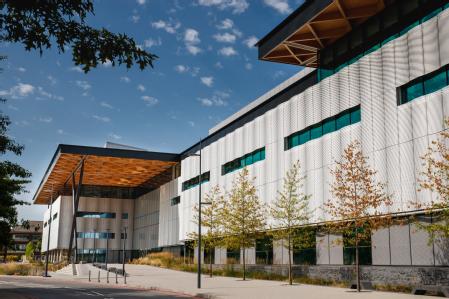 The Professor Lord Bhattacharyya building, home to NAIC (National Automotive Innovation Centre) at WMG, University of Warwick, has been shortlisted for a RIBA Client of the Year award, by The Royal Institute of British Architects.
The Professor Lord Bhattacharyya building, home to NAIC (National Automotive Innovation Centre) at WMG, University of Warwick, has been shortlisted for a RIBA Client of the Year award, by The Royal Institute of British Architects.
Following it’s 2021 RIBA regional and national award wins, the Centre has now been shortlisted for RIBA Client of the Year.
The NAIC is a partnership between WMG, University of Warwick, Jaguar Land Rover, and Tata Motors, and is the largest of its kind in Europe and is well timed, arriving when a global mobility revolution is underway, with a new age for transport mobility.
A beacon for automotive research it brings together the brightest minds from industry and academia, to develop future vehicles and mobility solutions. It is home to up to 1,000 staff working across design, engineering and research, as well as future engineers on degree programmes.
Designed by Cullinan Studios the brief for the Centre was for simplicity and strength of purpose, turning a complex assembly of spaces into an immediately legible building.
The NAIC is a £150m investment between WMG, Jaguar Land Rover, and Tata Motors with £29.5m funding from the UK government’s UK Research Partnership Investment Fund through Research England, which includes the development of an Advanced Propulsion Research Laboratory.
Coventry’s Affordable Very Light Rail Track Unveiled
§ As part of Coventry Very Light Rail (VLR), Coventry City Council’s flagship transport project, a novel track form has been designed and manufactured by researchers from WMG, University of Warwick, together with their design partners Ingerop/Rendel.
§ The track sits just 30cm into the road surfacing, whereas traditional tram tracks typically involve digging a metre down and moving utilities such as water, gas and electricity.
§ As a result of its shallow depth and ability to be embedded in an existing highway the cost is significantly lower.
§ The urban VLR track may cost as little as £10m per km to install, compared to traditional trams which cost upwards of £25m per km, sometimes as much as £100m per km in city centre locations, making urban rail a possibility for smaller towns and cities in the future.
Coventry Very Light Rail (VLR) took a major step forward on 24 September as Coventry City Council and WMG, University of Warwick showcased a breakthrough new track design which aims to drive down the costs associated with the installation of urban light rail.
Bringing together stakeholders from Coventry and across the West Midlands, engineers from WMG, University of Warwick provided further details on the Coventry VLR track form, which has been designed in partnership with Ingerop and its UK subsidiary Rendel.
At the University of Warwick’s ‘The Slate’ conference centre researchers from WMG, University of Warwick spoke about the engineering challenges that had been overcome in the design of the track form.
Councillor Jim O’Boyle, cabinet member for jobs, regeneration and climate change at Coventry City Council, spoke about the potential for Coventry Very Light Rail to transform public transport in Coventry and in smaller and medium sized towns and cities, enabling the next generation of clean, green transport.
WMG, University of Warwick and Ingerop have successfully created, designed and built the novel track form, designed to sit just 30 cm inside the road surface, making it easy to install and remove, significantly reducing the impact on utilities and potentially saving millions of pounds lost to excavation and moving gas, electrical and telecommunication systems. The new track is expected to cost as little as £10m per km compared to current tram tracks, which can cost upwards of £25m per km, and up to £100m per km in city centre locations.
The track form has been developed in parallel to a zero-emission, battery-powered lightweight shuttle vehicle developed in partnership with TDI, which will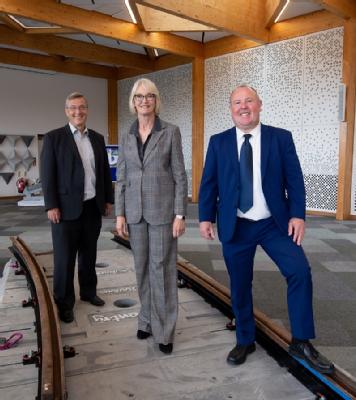 become autonomous, working like the London Underground system, where there is no timetable and passengers can hop on and off.
become autonomous, working like the London Underground system, where there is no timetable and passengers can hop on and off.
The vehicle is lightweight, and there will be no overhead power supply which is both costly and can have a negative impact to the city-scape.
Councillor Jim O’Boyle, cabinet member for jobs, regeneration and climate change, said:
”It’s incredible to see this one-of-a-kind, Coventry-led project move even closer to completion. Coventry Very Light Rail has the potential to provide Coventry, and towns and cities across the UK, with an affordable, high-quality transport mode using clean, green energy and it further cements our ambition to lead the green industrial revolution. Originated, designed and developed right here in Coventry it also has the potential to support new jobs in the future.
“This new track form, the first of its kind, is a critical part of the project and we would not be here today without the help of our incredible partners, some of the best engineering talent anywhere in the world, based right here in Coventry. I want to congratulate WMG and Ingerop on their success so far and I look forward to seeing the first tracks laid on our city’s streets.”
Dr Darren Hughes, Associate Professor at WMG, University of Warwick comments:
“The main driver of the Coventry VLR project was to make light rail as affordable and environmentally friendly as possible, and the track is the major part of this.
“Working with Ingerop we have successfully achieved this goal, making a unique track form using advanced materials and manufacturing processes which is not only affordable but also allows rapid installation, minimising disruption to local properties and businesses. The progress made is an excellent example of a city council, a university and an industry partner working together to solve a public transportation challenge.”
Margot James, Executive Chair at WMG, said:
“It is very exciting to see the latest development in the Coventry VLR project. The track technology is a world first, and reaching this milestone is a testament to the strength of the consortium and the hard work of all our partners. I am thrilled at the pivotal role WMG and the University of Warwick have played in this ground-breaking piece of work.”
Philippe-André Hanna, Director for Transportation at Ingerop added:
“We work all around the world on light rail schemes, in France, Spain, Africa and in the Americas and these have been very successful in bringing affordable public transport to urban areas. Light rail provides comfort, safety and frequent services, and has the potential to take people out of their cars, and reduce air pollution. We had been working over many years on how to optimise the depth of the trackform from the usual typical depth of 56cm one in order to reduce costs and to avoid having to divert any utilities.
“When we met WMG, University of Warwick and Coventry City Council, we were immediately struck by the potential to bring about a revolution in the light rail market and found the project extremely exciting. Together with WMG, and our UK subsidiary Rendel, a company active for more 175 years in the UK, we created a fully integrated team and found a true spirit of a collaboration within the whole group. This allowed us to create a great product, which is extremely innovative, and thanks to that we have succeeded to reach a new standard of a 30cm depth of trackform construction. Reducing the depth of excavation, and avoiding the diversion and impact on all utilities, we expect a much lower cost of construction than the usual light rail systems.
“We are looking forward to installing the first slabs in the road in Coventry and thereafter providing Coventry with a new innovative, cost effective, comfortable and regular public transportation system.”
Coventry VLR is being led by Coventry City Council and supported by a number of partners, including the Black Country Local Enterprise Partnership, Coventry and Warwickshire Local Enterprise Partnership, Dudley Metropolitan Borough Council and the European Regional Development Fund.
-ENDS-
27 SEPTEMBER 2021
NOTES TO EDITORS:
High-res images available here:
IMAGE 1 LANDSCAPE
CAPTION:
Pictured left to right: Margot James (Executive Chair, WMG), Stuart Croft (Vice Chancellor, University of Warwick and Councillor Jim O’Boyle (Cabinet Member for Jobs, Regeneration and Climate Change, Coventry City Council), stand on the new Coventry VLR track form.
IMAGE 2 PORTRAIT
CAPTION:
Pictured left to right: Stuart Croft (Vice Chancellor, University of Warwick) Margot James (Executive Chair, WMG), and Councillor Jim O’Boyle (Cabinet Member for Jobs, Regeneration and Climate Change, Coventry City Council), stand on the new Coventry VLR track form.
Credit: Coventry City Council
For further information on the track please contact:
Alice Scott
Media Relations Manager – Science
University of Warwick
Tel: +44 (0) 7920 531 221
E-mail: alice.j.scott@warwick.ac.uk
For further information on the Coventry VLR project please contact:
Liam Hughes
Assistant Communications Officer
(Very Light Rail and Our Future Moves)
Coventry City Council
Tel: +44 24 7538 1192
Email: liam.hughes@coventry.gov.uk
Better use of data in infrastructure project delivery could save £23bn a year
Better use of data in infrastructure project delivery could save the sector £23bn a year, according to a new study, by WMG, that looks at how companies can use project data analytics (PDA) to transform project delivery.
The study was undertaken by the Project Praxis Group, at WMG, led by Professor Naomi Brookes and in partnership with The Oakland Group.
 Professor of Complex Programme Management and leader of the Project Praxis research group at WMG, Professor Naomi Brookes explains: “PDA involves using data better to support decision-making in project delivery. Feasibility studies indicate that using PDA better could produce savings of over £23bn per annum in the infrastructure sector. Yet, PDA is still not understood or widely adopted. Our investigation explains why this might be the case and what can be done about it.”
Professor of Complex Programme Management and leader of the Project Praxis research group at WMG, Professor Naomi Brookes explains: “PDA involves using data better to support decision-making in project delivery. Feasibility studies indicate that using PDA better could produce savings of over £23bn per annum in the infrastructure sector. Yet, PDA is still not understood or widely adopted. Our investigation explains why this might be the case and what can be done about it.”
The investigation combined the viewpoints of senior practitioners in infrastructure delivery from clients, contractors and professional service organisations. Participants included; Transport for London, Network Rail, Severn Trent and Sellafield.
It provided a unique and invaluable insight into the barriers and enablers of PDA that are being experienced right now in infrastructure project delivery.
Surprisingly technology was not seen as the problem, and neither was a lack of data analysts in the project delivery profession. By far, the greatest concern was the quality of data used in delivering projects. Improving data maturity was seen as the most important enabler for infrastructure organisations to benefit from PDA.
Participants were also very honest about how fear of new technology can inhibit the way in which PDA is used. People in delivery organisations are concerned that PDA will provide another stick with which to beat them. The report contains a full description of all of the barriers encountered by infrastructure project delivery organisations and the enablers to overcome these.
Richard Corderoy, Managing Director at The Oakland Group, said: “Our work with companies across the construction and utility sectors shows that integrating data insight and decision making into daily operations can be transformational. Organisations are often awash with data and just need help to access it in a way that can drive insight and change.
“Our support of the work with WMG highlights the pressing need to adopt data analytics into project planning and delivery. The savings highlighted in the report are significant and just the tip of the iceberg when you consider the wider economy.”
Ends
Notes to editors:
The Project Praxis Research Group in WMG, University of Warwick (www.warwick.ac.UK/fac/sci/wmg/research/transformation/project_praxis/) is a unique research groups specialising in the creation of ‘oven-ready’ new knowledge on complex project delivery that can be immediately adopted by practitioners to improve performance.
The Oakland Group (www.theoaklandgroup.co.uk/) is a Leeds-based full-service data consultancy operating at the intersection of process, analytics, and governance. Working with data, IT, and business leaders from VC backed start-ups to some of the UK’s most influential organisations.
For more information contact Nathan Lane on 07447 921654.
WMG Associate Professor finalist at Asian Women of Achievement Awards
Congratulations to WMG Associate Professor, Freeha Azmat, who was a finalist, in the Digital and Technology category, at the prestigious Asian Women of Achievement Awards 2021.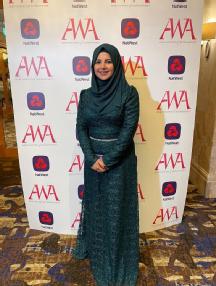
The Awards, founded by Pinky Lilani CBE DL in 1999, celebrate multicultural Britain and the contribution of diverse cultures and talents to UK society. The awards play a key role in redefining the contribution of Asian women; and informing a new, positive, pro-diversity debate.
Freeha said: “It was so inspiring to attend Asian Woman of Achievement Awards in London earlier this week. I was amazed to meet great women who paved their way to success against all odds. Each one of them was different, but one thing that we all had in common was hard work and resilience.
“Whilst I was not the winner, I feel honoured to be a finalist, for me it wasn’t about winning more about being in a room with women having extraordinary talent and inspirational stories.
“Thanks to Pinky Lilani and her team for developing this prestigious platform which recognises the accomplishments of Asian women.”
Read more about Freeha’s career here: Freeha Azmat (warwick.ac.uk)
Pioneering industry collaboration accelerates hydrogen refuelling innovation for HGVs
WMG is working with Midlands-based SME Hy-Met Limited and Logan Energy to deliver the Hydrogen Prototype Equipment for Refuelling (HyPER) project.
Together, the consortium will develop a next-generation hydrogen flowmeter for refuelling Heavy Goods Vehicles (HGVs). These will be used for hydrogen refuelling systems, and will be lightweight, smaller, more cost effective and more accurate than existing instruments.
refuelling systems, and will be lightweight, smaller, more cost effective and more accurate than existing instruments.
This follows recent funding from the UK Government’s Department of Transport zero emission road freight trials through Innovate UK. The project value totals around £170,000.
The new meter will also be easier to manufacture and maintain than current options on the market.
The project aims to reduce the cost of hydrogen refuelling and enable the wider adoption of hydrogen by transport fleets and other users.
Nishal Ramadas, co-founder and CEO of Hy-Met, said: “Since launching Hy-Met in January, we’ve been motoring ahead with our plans to help with the transition to net zero. With our innovative measurement platform, Hy-Met is combining our deep hardware and software expertise to tackle some of the complex measurement challenges facing the hydrogen sector.
“When building the consortium, we knew we needed partners with detailed knowledge of the requirements for hydrogen refuelling and advanced manufacturing and prototyping capabilities.
“Our choice of project partners was clear and we are very happy Logan Energy and WMG have joined us in tackling this refuelling challenge.”
Bill Ireland, Chief Executive at Logan Energy, said: “Using hydrogen to power lorries is one of the key steps towards helping Scotland and the UK tackle the climate emergency.
“Making the switch from burning diesel to using hydrogen will cut the amount of carbon dioxide and other harmful gases being pumped into the atmosphere.
“There are a number of advancements we need to take before hydrogen becomes commonplace on our roads and one of the crucial elements is making it cheap and easy to refuel.
“For nearly three decades Logan Energy has been at the forefront of developing new and innovative hydrogen technologies both here in the UK and abroad. This collaborative partnership with Hy-Met and WMG is another step towards helping the UK grow its capabilities within the hydrogen industry and the drive to net-zero.”
Dmitry Isakov, Assistant Professor at WMG, said: “Securing this funding from the Department of Transport through Innovate UK will help us to accelerate our work. Working alongside Logan Energy and Hy-Met will allow us all to combine our knowledge and expertise to develop an industry-leading hydrogen flowmeter.”
New National Electrification Skills Framework and Forum could put the UK at the forefront of the green revolution
§ In order to meet Net Zero carbon commitments the UK needs to invest in technologies for electrification, meaning many employers and employees will need to up-skill, re-skill and new-skill to meet the demand
§ A national approach to re-skilling, up-skilling and new-skilling the workforce for the electric revolution has been established by WMG, University of Warwick alongside the Faraday Institution and the High Value Manufacturing Catapult in their report: ‘The Opportunity for a National Electrification Skills Framework and Forum’
§ The report emphasises the need for education providers to collaborate on offerings, industry to define their needs, and enables training providers and employers to collaborate on the development of courses required to enable workforces to meet the challenges of the electric revolution and put the UK in a position as a world leader
 New technologies and a skilled workforce are both essential to meet the challenge of net carbon zero. To ensure the UK is ready for the transition, a new skills framework has been created by WMG - University of Warwick, The Faraday Institution and the High Value Manufacturing Catapult.
New technologies and a skilled workforce are both essential to meet the challenge of net carbon zero. To ensure the UK is ready for the transition, a new skills framework has been created by WMG - University of Warwick, The Faraday Institution and the High Value Manufacturing Catapult.
The Government’s plan to ban sales of new diesel and petrol cars by 2030 has pushed the automotive sector, along with many others, to rapidly adopt, and develop, electrified products at a rate that will continue to increase for the next 10 to 15 years. How transport and utility sectors can re-skill, up-skill and new-skill their workforce to meet skills demand at the point of need has been outlined in ‘The Opportunity for a National Electrification Skills Framework and Forum’, authored by WMG, University of Warwick; the High Value Manufacturing Catapult; and the Faraday Institution.
Aimed at employers, training providers, accrediting organisations and learners the report discusses how industry engagement, along with educational collaboration rather than competition, will be key in putting the UK at the forefront of the electric revolution and securing future work opportunities.
The Framework recommends the use of short and long courses, as well as continuing professional development, to deliver the competency sets to meet electrification goals across a range of sectors. The framework currently considers vehicle electrification as well as battery manufacture, power electronics, motors and drives, and learnings will next be extended to rail, aviation and utilities.
Through engagement with industry participants and educational providers, the report identifies the key principles and skills needed to make the UK a world leader in electrification. By re-skilling, up-skilling and providing routes through from education to enable new-skills, employees can progress in their career and companies provide a viable way of managing and developing the skills of workforces in line with business objectives.
In order for the UK to successfully transition to an electrified and Net Zero future it is essential that all aspects of industry and education collaborate. The forum provides an opportunity for not only different companies from multiple sectors to work together, but also for training providers across the UK to collaborate and crystallise the need for training, enabling the right courses to be offered at the point of need. Overall the forum will help create skills development opportunities, and make the electric shift as smooth and sustainable as possible.
forum provides an opportunity for not only different companies from multiple sectors to work together, but also for training providers across the UK to collaborate and crystallise the need for training, enabling the right courses to be offered at the point of need. Overall the forum will help create skills development opportunities, and make the electric shift as smooth and sustainable as possible.
Professor David Greenwood, CEO of WMG High Value Manufacturing Catapult at the University of Warwick comments:
“Electrification of automotive and aerospace industries, as well as the establishment of UK battery production facilities (gigafactories) represents a considerable industrial opportunity for the UK and one where having a workforce with the required skills and capabilities will be essential for the nation to compete successfully on the European stage.
“As these sectors transform to fully electric products, we have a proposed national plan for electrification skills, through which we will define a framework to deliver a workforce with the required skills and capabilities to deliver the sectoral technology roadmaps. This focus will be essential for the sector to develop thrive in a highly competitive global industry.
“We are proud to launch this forum, through which the electrification skills framework will be shaped by the wisdom and direction of automotive technologists, educators, accrediting bodies and training providers. It will provide a framework for a national skills programme, delivering at a regional level according to industrial need.”
Tony Harper, the Director of the Faraday Battery Challenge at UK Research and Innovation comments:
"UK industry is undergoing an exciting and rapid transformation to fulfil the UK Government’s 2050 Net Zero commitments. This once-in-a-generation, global technological revolution leaves competency gaps at all job levels, particularly in engineering and manufacturing roles which will need to be filled with specific education and training.
“We are pleased to make available a UK-wide framework and forum to ‘re-skill, up-skill and new-skill’ the UK engineering and manufacturing workforce, a major step forward to ensuring the right skills are in place at the right time.
“Our report defines the training and investment in people, education and skills that will allow the UK to Build Back Better and secure greener jobs in a flourishing UK electrification sector.”
Business Minister Lee Rowley said:
“We are leading the world in developing the latest technology in electric vehicles and today’s report demonstrates the work that employers and industry organisations can collaborate on to keep the UK in that pole position.
“This revolution in our automotive sector will create thousands of jobs, building on our rich industrial heritage and giving opportunities to our talented and highly-skilled workforce – all this will be essential as we work to eliminate our contribution to climate change by 2050.”
§ The report ‘The Opportunity for a National Electrification Skills Framework and Forum’ will be available online from 22 September at: https://hvm.catapult.org.uk/reports/national-electrification-skills-framework
§ Information on course materials will be available from 22 September at: https://hvm.catapult.org.uk/resources/courses
ENDS
22 SEPTEMBER 2021
NOTES TO EDITORS
To get involved in the electrification skills forum as a provider or employer please e-mail: electrification-skills@hvm.catapult.org.uk
High-res images available at:
https://warwick.ac.uk/services/communications/medialibrary/images/september_2021/nesf_1.jpeg
https://warwick.ac.uk/services/communications/medialibrary/images/september_2021/nesf_2.jpeg
https://warwick.ac.uk/services/communications/medialibrary/images/september_2021/nesf_0033.jpeg
Caption: The National Electrification Skills Framework and Forum aims to support new technologies and a skilled workforce in transport, battery manufacturing, and beyond.
For further information or an embargoed copy of the report please contact:
Peter Thorley
Media Relations Manager (Warwick Medical School and Department of Physics) | Press & Media Relations | University of Warwick
Email: peter.thorley@warwick.ac.uk
Mob: +44 (0) 7824 540863
About WMG, University of Warwick
WMG is a world leading research and education group, transforming organisations and driving innovation through a unique combination of collaborative research and development, and pioneering education programmes.
As an international role model for successful partnerships between academia and the private and public sectors, WMG develops advancements nationally and globally, in applied science, technology and engineering, to deliver real impact to economic growth, society and the environment.
WMG has a track record of impact and collaborative R&D in batteries, through their Energy Innovation Centre. A unique UK facility which is capable of producing full-size prototype battery cells in sufficient quantities for industrial testing. The Centre is focused on identifying and demonstrating battery chemistries with higher energy densities and improved safety while achieving the cost criteria set by the automotive industry. This technology is transferred to other sectors including, aerospace, marine, rail and static energy storage for home applications.
WMG’s education programmes focus on lifelong learning of the brightest talent, from the WMG Academies for Young Engineers, degree apprenticeships, undergraduate and postgraduate, through to professional programmes.
An academic department of the University of Warwick, and a centre for the HVM Catapult, WMG was founded by the late Professor Lord Kumar Bhattacharyya in 1980 to help reinvigorate UK manufacturing and improve competitiveness through innovation and skills development.
About the Faraday Institution
The Faraday Institution is the UK’s independent institute for electrochemical energy storage research, skills development, market analysis, and early-stage commercialisation. Bringing together expertise from universities and industry, the Faraday Institution endeavours to make the UK the go-to place for the research and development of new electrical storage technologies for both the automotive and wider relevant sectors.
The Faraday Institution is funded by the Engineering and Physical Sciences Research Council (EPSRC) as part of UK Research and Innovation. Headquartered at the Harwell Science and Innovation Campus, the Faraday Institution is a registered charity with an independent board of trustees.
The Faraday Battery Challenge aim is to develop and manufacture batteries for the electrification of vehicles to help UK businesses seize the opportunities presented by the move to a low carbon economy. The challenge is split into three elements: research, innovation, and scale-up.
About High Value Manufacturing Catapult
The High Value Manufacturing Catapult has an established record as the UK’s principal agent of industrial transformation. Working through seven centres of innovation, the HVM Catapult is creating the conditions for UK economic growth by enabling UK manufacturers to investigate new technologies and processes and achieve performance and productivity improvements through innovation.
Established by Innovate UK, the HVM Catapult bridges the gap between business and academia, helping to turn great ideas into commercial realities by providing access to world-class research, development facilities and expertise that would otherwise be out of reach for many businesses in the UK. The HVM Catapult prides itself on helping businesses to transform the products they sell, the way they make them and the skills of their workforce to remain competitive in a global marketplace.
22 September 2021
Lord Bhattacharyya Award winner announced
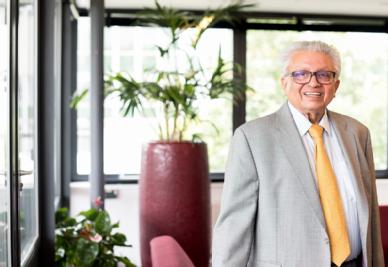 The Royal Academy of Engineering and WMG, at the University of Warwick, have announced the University of Surrey’s 5G Innovation Centre (5GIC) as the first ever winner of the Bhattacharyya Award.
The Royal Academy of Engineering and WMG, at the University of Warwick, have announced the University of Surrey’s 5G Innovation Centre (5GIC) as the first ever winner of the Bhattacharyya Award.
The Award, which carries a £25,000 prize, has been presented in recognition of an exemplary academia-industry partnership that has helped to build the UK’s work in 5G technology from the ground up, and produced world-leading innovation in the field.
The Bhattacharyya Award is funded by the Department for Business, Energy and Industrial Strategy and was created to encourage more private and academic entities to collaborate, as a tribute to the late Professor Lord Kumar Bhattacharyya KT CBE FREng FRS, Regius Professor of Manufacturing at the University of Warwick and founder of WMG.
Margot James, Executive Chair at WMG, University of Warwick, said: “This partnership exemplifies innovative academia-industry collaboration, for which Professor Lord Bhattacharyya was a keen advocate. He believed in effective industrial strategy, with a focus on the impact of research and training and technology partnerships between industry and universities. This inaugural Lord Bhattacharyya Award will inspire the next generation of academics and industry experts to come together to create more ground-breaking research.”
Surrey’s 5GIC has built collaborations with more than 27 global industrial partners and over 300 UK SMEs since its launch in 2013, bringing together leading academics and companies to help develop the 5G infrastructure that will underpin the way we communicate, work and live our everyday lives. 5G technology is estimated to be worth up to £173 billion to the UK economy by 2030, increasing productivity, driving modernisation and enabling transformative applications in automation, healthcare, manufacturing, self-driving vehicles, and remote robotics. Its evolution to 6G is set to address grand societal and industrial challenges, such as the digital divide, and privacy, as well as support efforts towards achieving the net-zero national agenda.
Regius Professor Rahim Tafazolli, Head of the Institute for Communication Systems (ICS) at the University of Surrey and Founder and Director of the 5GIC, said: “Collaboration with industry partners is at the heart of our achievements. The challenge of 5G could not be met without the close cooperation of major businesses with academia, and realising the benefits of the new technology by reaching out to regional communities and SMEs.
“We will use the Bhattacharyya Award funding to expand our overseas relationships – particularly with South Korea and Japan – and maintain our international profile. We will also use the prize to provide collaborative industry opportunities for training, knowledge exchange, and skills development for early careers researchers. All of these activities will be co-developed with industry to ensure that they meet the future needs of the UK and global workforce. We feel that this boost to skills development is particularly important to help offset the disruption caused by the pandemic.”
Science Minister Amanda Solloway said: “I am delighted to see the first Bhattacharya Award go to the University of Surrey’s 5G Innovation Centre (5GIC), whose work to bolster the UK’s competitiveness in 5G technology has already helped to attract nearly £100m of industry funding.
“5GIC puts collaboration between industry and academia at the core of its work, and I hope this award inspires other researchers, academics and industry experts to join forces as part of our efforts to build back better from the pandemic.”
Professor Dame Ann Dowling OM DBE FREng FRS, immediate past-President of the Royal Academy of Engineering, is chair of the judging panel for the Bhattacharyya Award. She said: “Had companies been working individually and with more limited collaboration with academia, these outputs and outcomes would have taken far longer to achieve. The collaborative work at 5GIC is enabling the UK to be a leader in the international competition. The Bhattacharyya Award aims to transform how universities research and educate to meet the needs of industry and society, which is exactly what the University of Surrey’s 5GIC has done, and we congratulate the team for setting such a high bar in this first cycle of the Award.”
